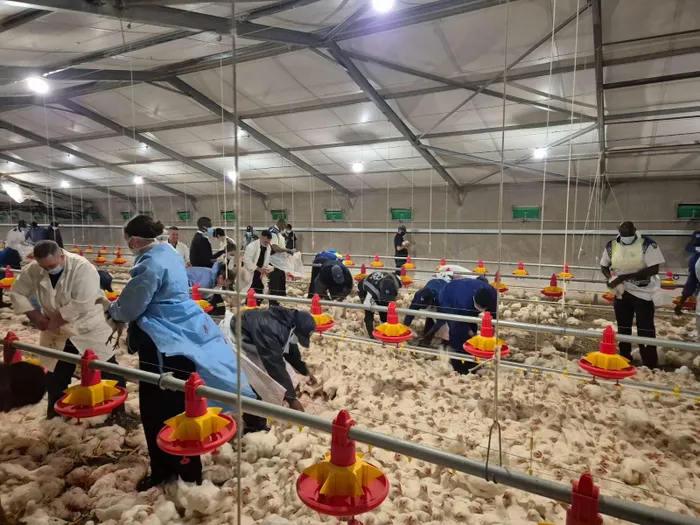
Daybreak Farms has become emblematic of some of the challenges facing the PIC’s unlisted investments portfolio during a period of heightened public scrutiny.
Image: NSPCA
THE Public Investment Corporation (PIC) faced intense scrutiny in Parliament last week over its handling of high-risk unlisted investments, including a hefty bailout of the embattled poultry giant Daybreak Farms.
South Africa’s largest asset manager of public funds was on the backfoot, defending its decision to inject more than R1.7 billion into Daybreak Farms, a vertically integrated poultry business on the brink of liquidation.
Daybreak has become emblematic of some of the challenges facing the PIC’s unlisted investments portfolio during a period of heightened public scrutiny. At the heart of the inquiry was Deputy Minister of Finance Dr David Masondo, who also chairs the PIC board.
Accompanied by senior PIC officials and the new chief executive, Patrick Dlamini, Masondo sought to clarify the PIC’s position amid growing public concern and media attention.
Masondo explained that the PIC had committed R1.7bn to Daybreak, with R250 million injected earlier this year and an additional R150m for operational expenses in February 2025, designed specifically to stave off liquidation.
He emphasised that “the PIC board does not intend to keep injecting funds indefinitely; the business must turn itself around to survive the crisis”. The message was firm: while the PIC remains a key investor, the responsibility to deliver a viable recovery rests with Daybreak’s management and board.
Acknowledging governance failings, Masondo outlined the troubles: “A board was appointed in 2021 but resigned the same year in May. A new board came in November 2022. Allegations surfaced regarding irregularities in the recruitment of Daybreak’s chief executive. Investigations found violations of PIC and Daybreak policies as well as general recruitment procedures.”
He confirmed these findings had led to resignations: “Most of the board members involved in the irregular recruitment process resigned. The board was subsequently strengthened with experienced members.”
Daybreak Farms is under business rescue, with a practitioner appointed and a rescue plan expected by August 22. Masondo stressed that liquidation must be avoided: “The board believed strongly that liquidation should be avoided due to the company’s importance to the economy, food security, and job preservation.”
He explained PIC’s limited direct operational role: “We do not run the businesses but appoint directors to boards when necessary to support turnaround efforts,” with appointments made under strict policy and approved by the PIC’s Directors Affairs Committee, chaired by Masondo himself.
Masondo framed the Daybreak issue within the PIC’s wider mandate. The asset manager invests on behalf of the Government Employees Pension Fund (GEPF), Unemployment Insurance Fund (UIF), Compensation Fund (CF), and others, with a stated goal to protect and grow workers’ retirement and social benefit funds.
He highlighted the PIC's growth since 2021: “Assets under management grew from R2.3 trillion in 2021 to R3trln in March 2025, a 30% increase. Over the past 10 years, growth has been at 68%.”
Regarding unlisted investments, which include direct equity ownership in companies such as Daybreak, growth was modest at best: “The value rose marginally from R125bn in 2021 to R127bn in 2025, just a 1.4% increase.” This was attributed to UIF and CF suspending mandates over earlier concerns.
Masondo also reiterated the PIC’s commitment to balancing financial return with social and environmental considerations. He said: “Since the beginning of its unlisted investment programme, PIC has created over 190 000 jobs.”
The PIC reported that it had shared with Scopa a list of the 20 best-performing companies and 20 that had failed, confirming that “most of the failed investments, including Daybreak, were made before the current leadership”. The one exception cited was Enable Capital, another troubled investment attracting media scrutiny.
Meanwhile, Scopa members did not let the PIC off lightly on pensioner concerns.
One member queried the contradiction between the PIC’s reported average annual return of 15.9% and the only 2.3% pension increase awarded this year, which was noticeably below inflation. The discrepancy raised questions about the flow-through of investment returns to pensioners.
Other areas debated included:
- Proposals for incentives to boost infrastructure investment
- The imperative to balance financial and social returns
- The PIC’s reported impact on job creation, empowerment, and governance
- Calls for greater transparency and accountability within PIC’s operations.
Masondo assured Committee members that all recommendations from the Mpati Commission investigation had been fully implemented by March 31 this year. This included wide-ranging governance reforms and the creation of an ethics office aimed at promoting ethical conduct and reducing risks.
Addressing recent media reports, he revealed: “A senior PIC employee was alleged to have solicited a bribe. This matter was reported via our whistleblowing platform. The individual has since been placed on precautionary suspension pending investigation.” He confirmed that “appropriate action will be taken based on the outcome”.